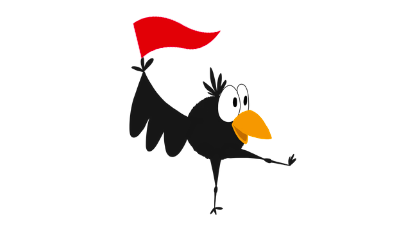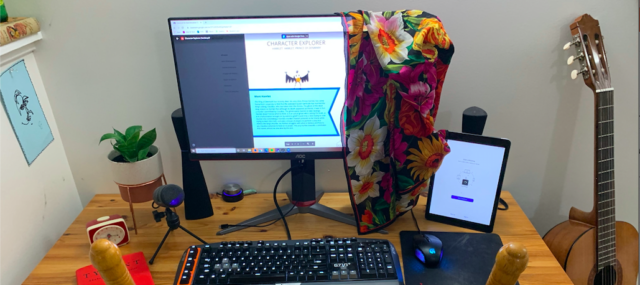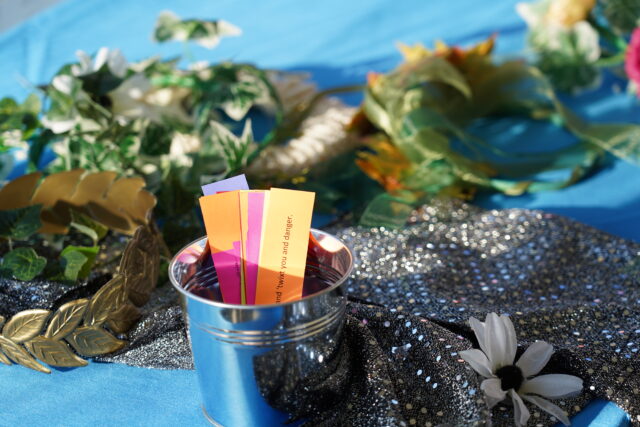To support our community this summer, Bard offered free digital camps & workshops. Bard’s education team adapted our beloved Young Shakespeareans program to invite new ways of exploring Shakespeare, performance and play in a virtual world. In this blog post, find out how this collaborative and creative adventure went for participants and teachers!

Guest post by Katie Johnstone, Bard’s Education Coordinator
Katie on Young Shakespearean’s this summer: For reasons we’ve all come to know too well, this summer at Bard was going to be different. We announced that the 2020 Festival would have to hold until 2021, which sparked many questions about our Young Shakespeareans summer camps & teen workshops: without our tents and stages in the park, what would become of this beloved summer program?
We called upon our community. Young Shakespeareans and their families were invited to join the Bard education team for a digital Town Hall, in which we asked them to consider: What about this program brings you joy? What do you value most? And for bonus points… can those things transcend location?
They told us they loved the camaraderie, the collaboration, and the meaningful connection made with Shakespeare’s language. Parents delighted in hearing their kids perform the text – sometimes months, even years later – and they valued the self-esteem that seemed to blossom over the course of the two-week session.
With their responses as our building blocks, we set out to adapt the camps & workshops for the digital world. Our incredible Teaching Artists and Riotous Youth Interns joined our team to “dream-storm”- we spent hours playing theatre games on Zoom, facing the glitches and plot twists as they came. The summer was winking at us; promising, but also intimidating.
July 6 came just as quickly as all anticipated days do. It was the first day of camp! We opened the “doors” to the Zoom meeting, our butterflies flew out, and 20 brilliantly keen participants flooded in, all ready for their week of exploring A Midsummer Night’s Dream. The first teaching artists to lead were Nadeem Phillip and Luisa Jojic. Along with the 8 to 13 year-olds in their camp, they brought magic and play to Zoom every morning. Over the subsequent weeks, we visited many different worlds through many different plays with over 70 Young Shakespeareans. By the end of each session, each group had developed the unique bond of a theatre ensemble. Their camp/workshop Finales were a bittersweet celebration- would they create theatre together again in the future?
Our team wants to thank everyone involved in the programs this summer for their courage, their creativity, and their friendship. Hear more about what it was like from our program participants, Young Shakespeareans and Riotous Youth Interns—the bold pioneers of Summer 2020 with Bard Education!
 |
 |
What did you enjoy the most about teaching Shakespeare virtually?
Valeria Ascolese, Riotous Youth Intern: In the midst of these unprecedented times, teaching Young Shakespeareans has been a gift. I did not take for granted the fact that we were able to come together and figure out a way to make the summer workshops work. It’s been such a fantastic experience to be a part of and proves that there are many other ways to teach Shakespeare. The ability to connect has been my favourite part of teaching Shakespeare virtually, and yes, I mean that in both a metaphorical and literal way. Not only are we connecting to the text that Shakespeare wrote together, but we are also sharing a moment in time from our own tiny Zoom boxes and welcoming everybody into our individual worlds. I am in awe of how engaged and advanced these students are when it comes to participating in class: reading, interpreting text, and their expertise on Zoom and all its settings. I end up learning just as much from them as they do from our class!

Sunshine O’Donovan, Riotous Youth Intern: I enjoyed the infinite possibilities, limited only by our imaginations. The participants could use a virtual background and whatever resources (instruments, props, etc.) they had at home to lay the scene, and select their own choices of costumes. This platform allowed the participants even more input and responsibility for their work. It reminded me that while big-budget productions can be entertaining, often the best theatre is spontaneous and incorporates what the artists have at hand, allowing the artists to have fun and play. Even adults need to remember how to do that! It was exciting to delve into the sonnets, especially as you never see them performed! The imagery was so vivid that it made me wish I had read some of them sooner. We also had the participants write their own sonnets and it was incredible the abundance of talent that was present. I hope to see more of their work in the wider world someday.
What surprised you the most about learning online?
Julie Wang, Young Shakespeareans teen participant: I enjoyed learning about the magic of creating a show through Zoom, such as using virtual backgrounds and voice modulations all through a screen. I was most surprised by how convenient it was to access all of the material needed for exploring Shakespeare virtually. I never had any trouble finding what I was looking for and the teaching artists led me in every step of the way to success.

Anaïs Foroughi, Young Shakespeareans junior participant: It was great that we could still do a play online and I loved the videos and packages that we received by email. At first I thought it would be difficult to do a play virtually, but we had breakout groups where we could rehearse things before doing our part in front of the whole group. There are some good things about being online too – you can private chat with friends and if people were being distracting, there’s a “mute” function. It came in handy sometimes!
Have you participated in Young Shakespeareans before? If so, how did exploring Shakespeare online change the experience for you?
Annabelle Chiang, Young Shakespeareans junior participant: I never joined Young Shakespeareans in person before, this summer was my first time. DoingYoung Shakespeareans online is different from going outside because you can make amazing things with stuff you have at home. I participated in 3 Young Shakespeareans online workshops this summer – they were all very fun and interesting! I really enjoyed learning about the play, the characters, and cool new Shakespeare words. Most of all, I loved being in the play. I joinedYoung Shakespeareans because I like acting and watching plays and I look forward to joining more workshops.
Anaïs: I loved the production I was in last year, when I was Celia in As You Like It. It was such an awesome experience! I had some relatives from LA come for the show and they were very impressed with all of us. I really wanted to do another camp, so I was so happy when I got into it this summer. The last day, our parents could join the meeting to see the play. Although it wasn’t exactly the same, it was still pretty great!

Young Shakespeareans Workshop from home!
Have you taught theatre workshops before? If so, how did teaching online change the experience for you?
Valeria: I work at different drama schools and daycares around the city as a Preschool Drama Teacher. I usually teach the 3-6 years old range and I love it. Teaching has become one of my greatest passions and I hope to keep on doing it for the rest of my life because it’s a profoundly rewarding experience. When the pandemic broke out and everything shifted online, I was terrified. I didn’t understand how we could do everything we do in person on an online platform, since the age range I teach is so engaged when they are physically in class in front of a screen.
Teaching online has taught me to trust more. This lesson was reinforced when I assisted Nadeem Phillip in the A Midsummer Night’s Dream‘s workshop earlier this summer. I remember seeing how calm and collected he was, and how he reminded the young participants that he trusts everyone will listen and engage in our activities because we are physically so far away, that is the only thing we can do, trust. This was a big lesson for me both as a human being, a teacher and an artist. During these hard times, we can only trust that everything will get better, that we can readjust to a new way of living, that we can still connect with people even if we’re not in the same room and trust that we are still artists who are resilient and can adjust to any scenario for our craft.

Sunshine: I was a Young Shakespeareans participant for two years before teaching in the program for the first time last year. Because we didn’t have the same face-to-face resources this year, we all had to stretch our brains to think of new ways to share the work with audiences. The online experience also levelled things a bit because the Teaching Artists knew about as much as the participants in regards to performing Shakespeare online. So, in a way, it was an even more collaborative process since everyone was new to it. This back-and-forth launched new ideas off of old ones, which as a teacher was absolutely inspiring to see both the creativity and the practical efforts to tether that online, so it could be shared. It made me realize how lucky we are to work together, no matter what the situation. Shakespeare’s words have the ability to move and transport the viewer, regardless of the platform from which they spring forth.
What were you most excited to try during the digital Young Shakespeareans workshops?
Anaïs: I was in a production of As You Like It last year. After the first day I knew I wanted to do this camp every summer. I was so disappointed when it looked like it was canceled because of COVID-19. Then my mom told me that there was a chance I could take it online. It changed significantly for me because I don’t really like online classes, but I liked this class! I don’t like having to do things at home, but we did fun things like drawing characters and coming up with our own costumes. It was a great change.
Julie: I always thought that Bard on the Beach was only a Shakespeare Festival, however, when I heard from a friend that they were offering a free online program, I was eager to see what it was all about. During quarantine, there was not much I could do since I was stuck at home. I had never participated in a summer workshop before, so I wanted to immerse myself in the world of summer education before school started.
Sunshine: The digital workshop was a week long, so I thought participants might get through a lot less material than they did. There was a definite time-crunch, but the participants were professional and willing to play, explore, fail and question. The condensed time frame made for a more fully-engaged experience.
Valeria: The opportunity to do these plays in a way that has literally never been done before was what excited me the most. I loved seeing how everything came together, how we could use anything we had at home to help our telling of the story and how we incorporated a little piece of the spirit of each one of the students into the play. How can we paint the picture of the story using what we have at home and who we are truthfully and in a way it serves the story? This is something that I worked on during A Midsummer Night’s Dream and I am currently working on in The Tempest with Dawn Petten and my fellow Riotous Youth, Ali Grams. In Dream, we worked with costumes, movement, imagery and sound in order to understand and rehearse the many different scenes and settings of the play, whereas in The Tempest, we are currently working on lots of visuals, physical movement and soundscapes based on the specific event of the storm. It’s equally exciting to assist and facilitate whatever it is that the Teaching Artist has planned and envisions for the week. I love being part of the creative process and it really is special to be able to do it with actors whose work I admire.

Materials organized before a digital workshop!
Any other stories you would like to share about your experience?
Valeria: In A Midsummer Night’s Dream, I had the opportunity to lead the rehearsals of some scenes in ‘Breakout Rooms’ on Zoom. This allowed me and the students in those specific scenes to focus on the text and go further with the “painting” of the story we are telling. I worked with four kids on a particular ‘Titania and Fairies’ scene, in which the fairies are waking Titania up. One of the students had training in TaeKwonDo, while another student was interested in doing foley sounds and accompaniment and the remaining two students were open to engage in different ways. The student mentioned above taught us all some TaeKwonDo moves, which we used for the movement portion of the scene, and the other student created a soundscape with a harmonica. By the end of our 20-minute Breakout Room session, they were all memorized with their lines and we had created an ensemble piece by working together in a safe environment. It was so rewarding and special to see them confidently say their lines, while incorporating movement on their feet and creating accompaniment to further paint our story. It makes it even more special to know that these students felt safe to do all of this during our rehearsal, and subsequently our showcase.
As a fairly new teacher in this evolving world, I am continuing to learn/unlearn from traditional theatre and teaching practices, what works and what doesn’t work. Now more than ever, it is so crucial for anyone who is in a teaching position to dismantle outdated and oppressive ideologies. The first one being the “Teacher/Student Power Dynamic”, in which the teacher holds the higher status in this relationship. Having been both a student and a teacher, I do not subscribe to that idea. I am learning from my students as much as they learn from me, and there are still so many things that we, as teachers, have yet to discover. As a Latina and Italian woman, I am constantly trying to decolonize my practices and embrace individuality in my art and in my work. “How do we decolonize Shakespeare?” has been the question that has been explored the most this summer amongst the Bard Education team – a question that is much needed, yet delicate when it comes to teaching younger kids. How can we use the text and make it reflect the world in which we live today? How do we justify some problematic themes written hundreds of years ago to do it here and now? How can we do all of this without overwhelming the students? These are questions that can even overwhelm an adult. Everyone might have their own version of what decolonizing looks like, but we must continue to explore and find the answers to these questions in our work- even if it feels scary. For me though, the answer clicked when I worked on that scene with the students – we must always embrace our full selves-our ancestry, our heritage, our skills and our talents into the work. In the midst of it all, the most revolutionary act we can do is to fully embrace our truth and find ourselves in these stories through that connection.
Sunshine: During the second day of the workshop, we asked participants to dress up as their “muse”, a character who inspired the participant and their work. I could never have imagined how varied and thought-out each costume was. Earlier we had asked each participant to name a muse, and many people cited historical figures. Yet, when the day came to show up as the muse, often there was a different persona. This made me realize that maybe people often look outwards for inspiration, but when given enough time and thought, that inspiration comes from inside, dressed up and delivered by each person’s own inner processes. We can admire the achievements of others, but we can’t be them, so our best learning and creating comes from following our own hearts. I loved the process of creating the backstory for my muse. It made me appreciate how dramatic characters are hatched, nurtured, and set loose upon an audience. With all the creative buzz in our workshop, it made me look forward to the time when we can again create together in person.
Anaïs: Once, in online class, we played a prank on the teacher and turned our videos off and changed our name to “Reconnecting…”! I also made some friends online and we will try to get together soon.
Young Shakespeareans Camps & Workshops are generously supported by

Riotous Youth Internships are generously supported by


